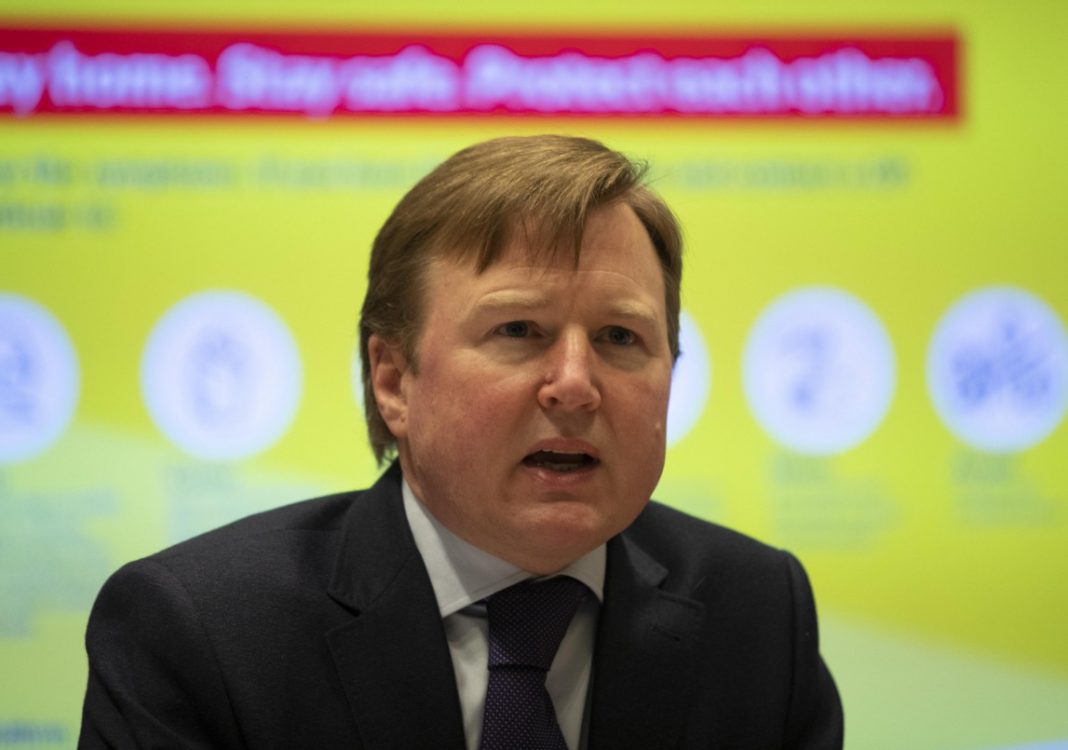By Michael O’Farrell and Valerie Hanley
COVID experts have criticised Government failure to tackle the virus at meat plants, which are at high risk of the powerful new Brazilian strain.
Dr Cillian de Gascun of NPHET warned of the urgent need for sick pay laws that can help prevent migrant workers in the factories from spreading the virus.
The head of the National Virus Reference Laboratory told the Irish Mail on Sunday he was disappointed that legislation to deal with the problem would not be in place until the end of this year.
Meanwhile, Trinity College Immunology Professor Tomás Ryan said vaccinating the meat plant workers could help reduce the threat of transmissions.
Their comments come after the discovery of three people here with the mutant strain, which is highly transmissible and could be resistant to the current vaccines, according to international scientists.
Fears are growing because many of the migrant workers live in shared accommodation while working in different areas, and may not show symptoms if they have the virus.
‘If you’ve got a sniffle or a cough and you’re a 28-year-old young, fit guy and you’re able to get €500 a week, but you go for testing and you’re down to €350 a week. That’s a big hit for you. That’s the problem,’ said Siptu’s agriculture and food sector chief Greg Ennis.
And he warned: ‘I’m telling you if you go to buy a box of paracetamol in those towns, you won’t get them. That’s how they get through temperature barriers.’
Of the need for sick pay, Dr De Gascun said: ‘It is something we have to fix as a country.
‘There are pockets of society here – people we depend on, whether it be for care or for food, who don’t necessarily have the liberty to stay at home for 14 days, secure in the knowledge that either they’ll be paid for that time or indeed that their job will be there when they go back.’
The first three cases of the Brazilian variant, known as P1, and three more cases of the South African strain were confirmed in Ireland this weekend.
Prior to this there were six cases of a Brazilian strain related to the P1 variant in Dublin, Westmeath, Waterford and Cork. This strain – called P2 – is not considered as worrying as its P1 relative.
Also last night NPHET reported 26 additional deaths and 988 new Covid cases in the past 24 hours.
The Government has not revealed if the P1 cases, from a cluster in the east of the country, are linked to the meat industry in which thousands of Brazilians work.
But this week’s Health Protection and Surveillance Centre (HPSC) figures confirm that meat plants continue to have one of the highest levels of outbreaks, outside the health sector. There have been 31 outbreaks associated with meat, poultry and fish plants since the end of November, involving 787 positive cases.
Unions are concerned that several recommendations about meat plants, made by the Oireachtas Special Committee on Covid-19 in October, have yet to be tackled.
The committee spent a significant amount of time examining what it called ‘the repeated and large-scale outbreaks in meat processing plants’ seen last year.
‘Meat processing plants emerged as a significant locus for Covid-19 infections in Ireland, even though this had also previously occurred internationally,’ the committee’s report reads.
‘There needs to be a further focus on the operation of that industry and an examination of the State’s unusual and unhealthy lack of oversight of the sector,’ it said. The report made a number of recommendations such as sick pay for meat plant workers, Covid-19 compliance officers for plants and changes to sector work permits.
It also warned that speed was vital if lives were to be saved.
‘That was in October in a pre-variant world. Since then some improvements have been made. For example, Health and Safety Authority inspections of plants are no longer pre-announced as they were last year. But little else has been done and meat plant outbreaks continue,’ said Mr Ennis.
The most crucial recommendation, sick pay, has been promised by the Government by the end of this year.
But that will do nothing to stop any variants in getting a foothold now, if that’s not already the case.
‘It’s not good enough for the Tánaiste to say we’ll have sick pay on the statute at the end of 2021. It’s too little too late,’ said Mr Ennis. ‘Nothing has been done by way of Covid compliance officers,’ he added.
In contrast Germany, which also saw large outbreaks in meat plants last year, has enacted laws that came into force on January 1.
Dr De Gascun told the MoS he was confident the monitoring for variants was working here.
The National Virus Reference Laboratory’s (NVRL) monitoring for variants via genome sequencing has increased to 10% of all cases – up from just 1% historically – and more increases are planned. However, he conceded it was impossible to know for sure what variants were in circulation.
‘It would be very difficult to say at any stage that there isn’t a particular variant on the island,’ he said. ‘We can’t guarantee that everyone is going to follow the rules. And it’s also very difficult to prove a negative.
‘I can never say for certain that something isn’t here but my level of concern would not be high that we are missing ongoing transmission of novel variants on the island.’
Meanwhile, Professor Ryan, Trinity Associate Immunology Professor, said: ‘We could be a lot better genome sequencing.’
Prof. Ryan, who is part of the Independent Scientific Advocacy Group, said there was a case for meat plant workers to be jumped up the vaccination queue to get ahead of the variants. ‘It would protect them and help reduce transmission in that setting,’ he said. ‘I’m very concerned. I don’t think we know that we have a handle on all of the variants that are here.’
‘Meat plants are worrying. I mean part of the story here is cheap labour and when you are getting workers into meat plants they are not going to be able to afford to pay for quarantine so the Government or the meat companies are going to have to pay for that.
‘We have an over-reliance on very cheap labour in that sector. These workers have to be paid to be in managed quarantine when you are isolating you need to be paid. I think people working in high-risk environments (such as meat plants) should be rapid tested every day.
‘I think our surveillance is not good enough. We have had many people coming in from Brazil but are we confident that these are the only three cases?’
And Trinity College Associate Professor of Clinical Medicine and Consultant, Dr Cliona Ní Cheallaigh, warned that relying on a variant to be detected accidentally may mean it is too late to contain it.
Since Christmas – and in advance of a hotel quarantine system being set up – Ireland’s sequencing efforts have been increasingly targeted at travellers arriving from risk areas. But this is useless against those who ignore the rules.
According to Government figures, 2,191 Brazilians arrived in late December and throughout January. Of these, 1,900 were later texted by public health authorities and asked to get a Covid test.
Just 604 complied – with 52 testing positive. But 1,587 never got tested.
Of those positives found from this group two have been treated as possible carriers of the Brazilian P1 variant – because, for technical reasons, their samples could not be fully sequenced to say for sure.
The Brazliian P2 strain wasn’t known here in December and has now begun to establish a presence. The same could be happening with the P1 variant.
The NVRL will begin sequencing a new batch of samples – including some flagged as possible variants of concern from Brazil or South Africa – tomorrow.
Meanwhile, the HPSC has this week issued new interim guidance for the meat sector.
‘It is now critical for all plants to review all systems, review all Standard Operating Procedures and to undertake joint tours of the plant with Department of Agriculture, Food and the Marine staff and environmental health professionals to check that all advice is being properly implemented,’ the guidance document reads.
The HPSC also issued new interim guidance on variants of concern to all clinicians, hospitals and public health staff. This guidance states that there is a need for ‘rapid detection’ of all potential variant cases.
Meat Industry Ireland, which represents meat plants, told the MoS: ‘Our members have seen vastly reduced international travel by employees since the onset of the Covid-19 pandemic including during the Christmas period. This is in line with Government and public health guidance on travel. Where travel did take place, employees were required to follow Government guidelines in terms of isolation and testing before return to work.’
It added: ‘Ongoing regular PCR testing of employees across the meat processing sector continues to take place.
‘To date, over 116,000 tests have been conducted with a very low positivity rate of 0.8%.’




